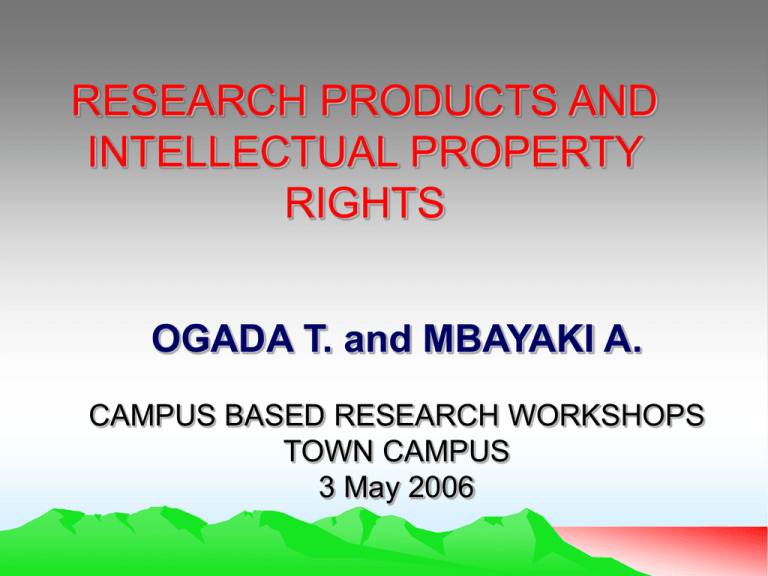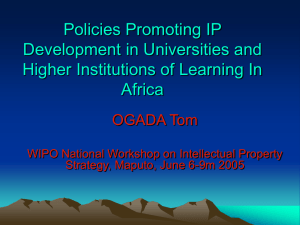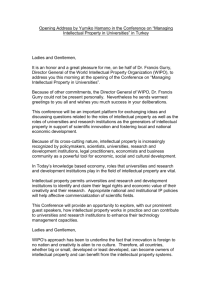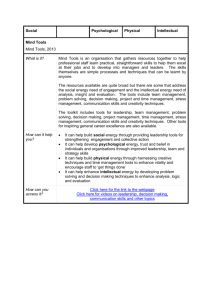Research Products And Intellectual Property Rights
advertisement

RESEARCH PRODUCTS AND INTELLECTUAL PROPERTY RIGHTS OGADA T. and MBAYAKI A. CAMPUS BASED RESEARCH WORKSHOPS TOWN CAMPUS 3 May 2006 Contents of Presentation Introduction Research Products and Intellectual Property Rights Moi University Intellectual Property Policy Conclusions and the Way Forward Introduction Role of Universities To train and develop manpower To generate new knowledge through research and development To contribute to national development through transfer of knowledge to society Level of Realization of the mandates of the universities in Africa Mandate One Universities have been effective in training and producing manpower, but People are questioning the quality Due to lack of job opportunities, the relevance of training is being questioned Mandate Two Universities in Africa are doing research and development, There is capacity for S&T in African Universities BUT – Limited Research funding – Funding is donor driven – Priority areas should be funded by local resources Mandate Three Transfer of Knowledge generated to society has remained the weakest point of African Universities Pursuit for knowledge for the sake of it is a luxury which can not be afforded Universities must produce return on investment There is need for paradigm change to put emphasize on knowledge transferred than knowledge generated RESEARCH PRODUCTS AND INTELLECTUAL PROPOERTY RIGHTS Research Products-1 The direct product of research is knowledge. That knowledge can be in the form of New Technology New Product New Process Improvement in existing product, process or technology Research Products-2 The dissemination of that knowledge through publications is not enough. R&D is only useful if its products can lead to Economic development Industrialization Job creation Poverty Reduction It is only through transfer of knowledge that a university becomes relevant to the society Research Products-3 Effective transfer of knowledge can only be realized through knowledge trade or commercialization of research products. Knowledge can only be commercialized if it becomes a property It must have a Legal Owner It must have a value There must be a market for it Useful R&D should generate research products which have commercial value and markets Research Products-4 There are two types of property Tangible Property – land, building, machinery Intangible Property – knowledge Old Economy Tangible property New Economy Intangible Property Research Products belong to a class of intangible property called intellectual property Commercialisable R&D products are therefore the drivers of modern economy Research Products-5 Intellectual Property Rights Copyrights Patent s Utility Model Industrial Property Industrial Design Plant Breeders Rights Marks Others Research Products-6 There are Four Methods through which an Intellectual Property Assets can be commercialized Licensing Sale Own exploitation – start up companies Joint ventures Research Products-7 The contribution of a university towards a country’s development can be measured through The number of intellectual property generated The number of intellectual property Licensed The number of companies created directly based on the product of R&D The number of jobs created The Number of consultancy offered Research Products-8 experience from abroad Patents Filed in 1997/1998 Japan USA Germany United Kingdom Kenya 357,379 198,953 44,438 17,938 27 Research Products-9 experience from abroad Industries Created Chalmers University of Technology has created 240 companies from its products of R&D during 30 years Research Products-10 experience from abroad Technology Transfer USA Universities US AUTM reports a total of 3765 license agreements based on technology transfer Some US $ 1.26 billion earned in 2000 earned by universities Research Products-11 Kenyan Patent Application Situation Kenyan informal sector is currently leading IP Applications (2004) SMEs (Jua Kali) Industry R&D Institutions Individual from university Secondary School University (MU) 116 45 14 2 1 1 The culture of innovation has not been developed Researchers in Universities and R & D Institutions innovate daily most of the innovation go unnoticed. • NEED FOR EFFECTIVE IP POLICIES IN UNIVERSITIES AND R&D INSTITUTIONS STAKEHOLDERS IN COMMERCIALISED IP Universities Inventors Researcher Students and research assistant Guest researchers Sponsor including industry Collaborators Government and Public UNIVERSITY OR R&D INSTITUTIONS • University as a stakeholder since it provides R&D Infrastructure Salary Goodwill University has a say on the generation, protection and commercialization of IP generated using university recourses INVENTOR The Inventor Develops proposals and Sources for R&D funds Undertakes R&D Intellectual inputs Inventor requires Adequate recognition and reward for intellectual input Need for publication and promotion must be safeguarded Sponsors, industries and collaborators Sponsors, industries and collaborators Provides R&D funds Equipment Research material Intellectual input The interests of the sponsors, industries and Collaborators must be taken care of Government and Public Government and Public are major stakeholders General source of funding for R&D infrastructure and operation expenses Invest in universities Expects returns Cares that the benefits reaches the widest scope of the society at affordable cost Technology Transfer Office • Technology Transfer Office Creates IP awareness Manages IP disclosure, filing and protection Markets IP and negotiates for licensing TTO Implements Obligation of University Obligations of Inventors Confidentiality SUMMARY • IP Policy is required To regulate the conflicting interests of the various stakeholders Promote IP development • Issues covered by IP Policy Issues covered by IP Policy Disclosure of IP Confidentiality Material Transfer Ownership of IP Sponsored research Collaborative research Publications IP Marketing and Licensing Revenue Distribution • MOI UNIVERSITY IP POLICY JUSTIFICATION To enhance collaboration with other institutions To protect the interest of Moi University To promote demand driven research To enhance technology transfer To generate income for Moi University To take care of the conflicting interests of the various stakeholders OBJECTIVES Promote creativity and innovation Expedites knowledge and technology transfer Reward staff for inventiveness and protect their interests Ensure equitable sharing of commercial benefits Spell out obligations of all stakeholders in IP generation and commercial utilization Process Started in 2002 A committee MU-KIPI formed Staff Sensitized Draft Discussed in Campuses Draft Discussed in Deans, Senate Council Council Approval given in August 2004 Document Officially Launched in November 2004 Policy currently being incorporated in MU Act Ownership of IP by Moi University Where inventor has used significant university resources Where inventor is specifically hired or commissioned to do the project For sponsored project unless otherwise stated in the contract Ownership of IP by Inventor Where inventor can prove that he did not use university resources Where the university is not interested to pursue the protection of the invention Where the university is not interested in commercial exploitation of the invention Publications, Theses and Dissertation Faculty, Students and Other employees shall own copyrights for their publications Publication of students Theses and Dissertations shall only be allowed after screening for IP Filing application for protection shall be considered for academic promotion Obligations of the University Ensure confidentiality with respect to inventor during disclosure Support commercialization of IP assets and technology transfer Ensure that the inventor is equitably rewarded for invention Provide mechanism for dispute resolution Obligation of the inventor Prompt disclosure of inventions Assist throughout process of registration and commercialization Respect commitments made in license, contract and sponsored research Disclose all potential conflicts of interests Distributions of net revenue Inventor IP Fund Inventors research Inventors department and faculty University wide research fund Technology Transfer Office • Implementation of Moi University IP Policy Technology Transfer Office Sensitize staff regarding IP Asses the potential of IP Evaluate the commercial potential of IP Obtain appropriate IP protection Locating commercial partners Negotiation and licensing Promoting use of patent documentation Agreements required Participation Agreement Material Transfer Agreement Confidentiality Agreement Contract Research Agreement Disclosure Agreement Consultancy Agreement Challenges of implementing the IP Policy Challenges Lack of IP Awareness Lack of Financial Resources Situation of the IP Office in MUholdings Situation in Kenya Institution that have IP Policy • Moi University, ILRI, ICIPE Institutions with drafts at advanced stage • University of Nairobi, • KEMRIi, • Kenyatta University • KARI and Egerton University Conclusion and Way Forward Moi University has in place structures and legal instrument to promote commercialization of R&D results Schools should take advantage of this There is need to change the emphasis to transfer of knowledge Schools should put aside finances to promote innovation and inventiveness DVC R&E office should set aside funds for the management and commercialisation of R&D






